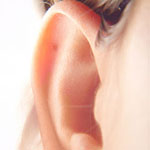Presbycusis – The Reason Adults Can’t Hear the Teen Buzz Ringtone
 Presbycusis also commonly spelled presbyacusis is a common degenerative condition that affects most of the adult human population. People who are affected by presbycusis usually start losing the ability to hear higher frequency noises ( > 17khz ) around the age of 18 and will progressivly deteriorate throughout their later years in life. The association between advanced age and high-tone deafness was first described by the Dutch scientist Zwaardemaker in 1899.
Presbycusis also commonly spelled presbyacusis is a common degenerative condition that affects most of the adult human population. People who are affected by presbycusis usually start losing the ability to hear higher frequency noises ( > 17khz ) around the age of 18 and will progressivly deteriorate throughout their later years in life. The association between advanced age and high-tone deafness was first described by the Dutch scientist Zwaardemaker in 1899.
The condition affects most adults and it is considered a natural side effect of aging, almost everyone will be affected by it at some point in their life. The exact cause of the sensorineural hearing impairment in individuals is unknown, but there are several suspected multifactorial reasons for it.
Possible Causes of Presbycusis:
- Arteriosclerosis: Arteriosclerosis may cause reduced perfusion and oxygenation of the cochlea. Hypoperfusion leads to the creation of reactive oxygen metabolites and free radicals, which may damage inner ear structures directly as well as destroy or damage mitochondrial DNA of the inner ear. This damage may result in the development of presbycusis.
- Diet and metabolism: Diabetes speeds the process of atherosclerosis, which might interfere with perfusion and oxygenation of the cochlea. Diabetes causes diffuse proliferation and hypertrophy of the vascular intimal endothelium, which may also interfere with perfusion of the cochlea. Increased intake of a fatty diet may also accelerate atherosclerotic changes in old age as well.
- Accumulated exposure to noise: Continuing Exposure to loud noises stresses the already hypoxic cochlea, speeding up the presbycusis process.
- Drug and environmental chemical exposure: Scientists presume smoking will accentuate atherosclerotic changes in blood vessels and therefore cause presbycusis to occur. Ingestion of ototoxic drugs (drugs that can be dangerous to the ear and or hearing process.) like aspirin may quicken the presbycusis process
- Stress
- Genetics: Genetic programming for early aging of parts of the auditory system may influence the development of presbycusis. Often, concomitant impairment of hearing, balance, sense of smell, taste, and visual acuity is associated with the aging process. Likewise, genetically programmed susceptibility to environmental factors (eg, noise, ototoxic drugs and chemicals, stress) may be involved.
Presbycusis and the Mosquito Ringtone:
As a result of people losing the ability to hear high pitch frequencies in middle and later stages of life; teenagers quickly discovered that they could use the ability of their youthful ears to their advantage by being able to hear notifications (text messages, incoming calls, etc… ) from their cell phones without adults being able to hear it. The mosquito ringtone allows teenagers to be notified of text messages and incoming calls when cell phone use is inappropriate (i.e. classroom, church, movie theater, etc…).
Presbycusis Diagnosis:
A quick method to determine if one is affected by presbycusis is to listen to our Teen Buzz / Mosquito Ringtones which are popular with teenagers because for the most part they have not yet developed presbycusis and can hear high frequency noises. The mosquito ringtone test should NOT be used as a substitute for medical advice from your doctor, if you have concerns you should speak with a Otologist.


May 3rd, 2008 at 8:16 pm
Alot of students are getting in trouble with this “ringtone.” It is a disruption of the learning environment, and the person responsible for drawing more attention to this should be ashamed. It’s bad enough that some students don’t want to be in school in the first place, but now the students who do enjoy learning have to be subjected to this type of disruption without saying anything in fear of being called a SNITCH! What is the world coming to? What are we teaching our students/children, how to ‘attempt’ to outsmart adults? Oh that’s really going to give them an advantage in the real world.
May 4th, 2008 at 4:43 am
as a teacher i am finding the mosquito ringtone an increasingly disruptive influence on classroom behaviour, i was hoping if there was anything that could combat this problem?
May 5th, 2008 at 12:27 pm
you can broadcast a constant ringtone frequency they are most likely using @180 deg out of phase to cancel it. or just bombard them with the frequencies they are using at high amplitudes and laugh at their feable ears…
September 15th, 2008 at 6:44 pm
I disagree….hypothetically with you all because of course it is interupting classes and learning, but they ARE kids…what’ll they come up with next? The next thing you know it’ll be their favourite thing to do. Here in Canada it is probably worse than in the USA
December 7th, 2008 at 2:29 pm
I love the mosquito ringtone. Kids, like myself, already have their phones on them in class anyways, I just kept it on silent and checked it ever minute or so to see my text messages, so just because I can hear when I get one now isn’t any more distracting, teenagers will be on their phones with or without this ringtone. It just makes it more convenient. =]
February 10th, 2009 at 6:51 pm
Sabrina you are obviously immature I am fourteen and a freshmen and I want a good education you’ll be the one working for me when your older have fun with that.
Don’t go to school if you have nothing better to do than annoy other kids I am actually a pretty cool kid and I still pay attention, too be “cool” you don’t have to be dumb.
Peace.
February 19th, 2009 at 10:42 pm
Hahaha, Im sorry jazmin your just to funny. Sabrina has a point . Wether we have the ringtone or not we’ll have our cellphones . Who knows maybe you’ll end up being a crack addicte in the future and you’ll be working for ME taking out my trash for a 10$ a week. You dont have to be dick to be cool
and you’ll be working for ME taking out my trash for a 10$ a week. You dont have to be dick to be cool 
Peace
April 14th, 2009 at 5:02 pm
u last three are all kind of right exactly who cares everyone is going to end up useing there cell phone but yeah thats another point it still can effect people learning but if u were satying focused cuz u wanted to learn then the noise really shouldnt bother you and this is comeing from a 13 year old so oviesly i pay attention get good grades but i still mess around and txt and stuff…..☺☻♥♦♣♠•◘○
June 12th, 2009 at 2:25 pm
i think that is is cool that some smart and resourceful kid used science to help her(or him). Most teachers think this is annoying but it is very interesting. It should not be hailed as completely stupid. If adults are mad, think about the “teen mosquito buzzer” if anyone should be annoyed- it’s the teens being forced to listen to these VERY ANNOYING sounds that are painful whenever they go to a shop!
July 18th, 2009 at 1:16 am
yeah, its ringtones now
; next it will be talking. it may already be happening I don’t know cuz I’m in my 40′s.
November 29th, 2009 at 3:14 pm
hehe =) lol yuh quys r funny…a cell phone isn’t distracting..just by having the ringtone it doesnt bother no one..i’m in advanced classes n even the smart ppl fckq use there phones
soo u could do something with ur life w/ education
i just do it cuz i want to && not go through a struggle to find a job
=) laterz…
February 16th, 2010 at 10:47 pm
I disagree with all the young kids. Im 19 and in college and that ringtone was popular while I was in highschool, and I hated it. Several times during class it would go off in different directions and you cant concentrate on anything. So yea I call what was being said immature and you wont understand till your all older. Maybe you all should get a job then you’ll know what its like working for min wage and youll pay more attention in class and not be on that phone addiction all the time. Life is so much more then that.
June 16th, 2010 at 7:38 am
Is there any way to get a machine to make this noise, LOUDLY, to counter-attach the obnoxious sounds from some car “boom Boxes”? They are played with no consideration for others. I’d like to deafen these dummies.
September 20th, 2010 at 6:35 pm
This ringtone is so obnoxious. Thanks for this article, I Was really confused as to WHY most adults can’t hear it. My mom CAN hear it though and she’s over 40. This proves that the plan is exactly foolproof. I don’t reccomend students use this ringtone in school because many teachers will probably still be able to hear it. Sorry kids!
February 19th, 2012 at 8:31 am
Just think how much the kids have learned about hearing and sound frequencies with this little experiment! They will try it for a bit and then switch back to more popular ringtones. The more we protest, the more they rebel. Test everyone’s hearing, reinforce the aural lesson, enjoy the joke and move on. There will be something new next week unless the schools lay down some heavy rules/policies that incite more teenage rebellion.